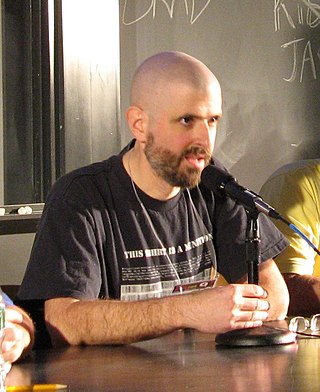Related Research Articles
Before the popularization of the Internet in the 1990s, Internet slang defined a luser as a painfully annoying, stupid, or irritating computer user. The word is a blend of "loser" and "user". Among hackers, the word luser takes on a broad meaning, referring to any normal user, with the implication the person is also a loser. The term is partially interchangeable with the hacker term lamer.
The Usenet newsgroup alt.religion.scientology started in 1991 to discuss the controversial beliefs of Scientology, as well as the activities of the Church of Scientology, which claims exclusive intellectual property rights thereto and is viewed by many as a dangerous cult. The newsgroup has become the focal point of an aggressive battle known as Scientology versus the Internet, which has taken place both online and in the courts.
news.admin.net-abuse.email is a Usenet newsgroup devoted to discussion of the abuse of email systems, specifically through email spam and similar attacks. According to a timeline compiled by Keith Lynch, news.admin.net-abuse.email was the first widely available electronic forum for discussing spam.
UUCP is a suite of computer programs and protocols allowing remote execution of commands and transfer of files, email and netnews between computers.
Mark V. Shaney is a synthetic Usenet user whose postings in the net.singles newsgroups were generated by Markov chain techniques, based on text from other postings. The username is a play on the words "Markov chain". Many readers were fooled into thinking that the quirky, sometimes uncannily topical posts were written by a real person.
In the Unix operating system, shar is an archive format created with the Unix shar utility. A shar file is a type of self-extracting archive, because it is a valid shell script, and executing it will recreate the files. To extract the files, only the standard Unix Bourne shell sh is usually required.

Sporgery is the disruptive act of posting a flood of articles to a Usenet newsgroup, with the article headers falsified so that they appear to have been posted by others. The word is a portmanteau of spam and forgery, coined by German software developer, and critic of Scientology, Tilman Hausherr.

UUNET, founded in 1987, was one of the first and largest commercial Internet service providers and one of the early Tier 1 networks. It was based in Northern Virginia. Today, UUNET is an internal brand of Verizon Business.

Chris Poland is an American guitarist, best known as the former guitarist of the thrash metal band Megadeth. Since 2002, Poland has been the guitarist of the instrumental rock/jazz fusion bands OHM and OHMphrey, among others, and has appeared on several projects and albums from a variety of different genres.
Newsgroup spam is a type of spam where the targets are Usenet newsgroups.

Joel K. "Jay" Furr is an American writer and software trainer notable as a Usenet personality in the early and mid-1990s.
HipCrime was both to the screenname of a Usenet user and a software application distributed by, and presumably written by, this individual or group. The name derives from a neologism in the John Brunner science fiction novel Stand on Zanzibar.
Email harvesting or scraping is the process of obtaining lists of email addresses using various methods. Typically these are then used for bulk email or spam.

James LoMenzo is an American musician, currently the bassist for thrash metal band Megadeth. LoMenzo was a member of White Lion, performing with them from 1984 to 1991. He was later the bassist for Black Label Society and Slash's Snakepit. In August 2021, LoMenzo was announced as the touring bassist for Megadeth following David Ellefson's dismissal and in June 2022 was announced as a permanent replacement. Outside music, he is known for being a contestant on the 21st season of the reality television series The Amazing Race.
A cancelbot is an automated or semi-automated process for sending out third-party cancel messages over Usenet, commonly as a stopgap measure to combat spam.
Chris Lewis is a Canadian security consultant from Ottawa, who fought spam on Usenet and the early Internet. Active in volunteer anti-spam efforts in the late 1990s and early 2000s, Lewis was described in Net.wars (1997) as "the best known active canceler of spam and other mass postings" at the time. In April 1998, he organized an unsuccessful moratorium with forty other anti-spam volunteers in an attempt to boycott internet service providers into doing their share against spam. He worked as a systems architect for Nortel and, as of 2017, is Chief Scientist at SpamhausTechnology.
A Usenet personality was a particular kind of Internet celebrity, being an individual who gained a certain level of notoriety from posting on Usenet, a global network of computer users with a vast array of topics for discussion. The platform is usually anonymous, although users can get celebrity status, usually by being deemed different from other posters in some way.

Make Money Fast is a title of an electronically forwarded chain letter created in 1988 which became so infamous that the term is often used to describe all sorts of chain letters forwarded over the Internet, by e-mail spam, or in Usenet newsgroups. In anti-spammer slang, the name is often abbreviated "MMF".

Usenet, USENET, or "in full", User's Network, is a worldwide distributed discussion system available on computers. It was developed from the general-purpose Unix-to-Unix Copy (UUCP) dial-up network architecture. Tom Truscott and Jim Ellis conceived the idea in 1979, and it was established in 1980. Users read and post messages to one or more topic categories, known as newsgroups. Usenet resembles a bulletin board system (BBS) in many respects and is the precursor to the Internet forums that have become widely used. Discussions are threaded, as with web forums and BBSes, though posts are stored on the server sequentially.
The Meow Wars were an early example of a flame war sent over Usenet which began in 1996 and ended circa 1998. Its participants were known as "Meowers". The war was characterized by posters from one newsgroup "crapflooding", or posting a large volume of nonsense messages, to swamp on-topic communication in other groups. Ultimately, the flame war affected many boards, with Roisin Kiberd writing in Motherboard, a division of Vice, that esoteric Internet vocabulary was created as a result of the Meow Wars.
References
- Ohm, Paul K. "ON REGULATING THE INTERNET: USENET, A CASE STUDY" (PDF). UCLA Law Review . 46: 1984. 46 UCLA L. Rev. 1941 (1998-1999). Archived from the original (PDF) on 2011-07-21. Retrieved 2010-02-20.
1984 ... technological innovations, with colorful names like Lazarus and Dave the Resurrector ... Dave the Resurrector is one of a class of computer programs called "resurrector bots." See supra note 11. These programs respond to cancel messages by reporting and reposting the canceled message. Dave the Resurrector reposts any message removed from the news.admin.net-abuse.* hierarchy. See Skirvin, supra note 33, at app. A(1).
- Skirvin, Tim. "Cancel Messages: Frequently Asked Questions, Part 4/4 (v1.75)" . Retrieved 2010-02-20.
Appendix A: Dave the Resurrector ... written and run by Chris Lewis